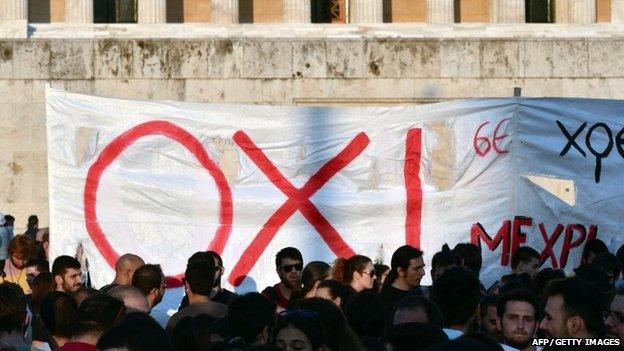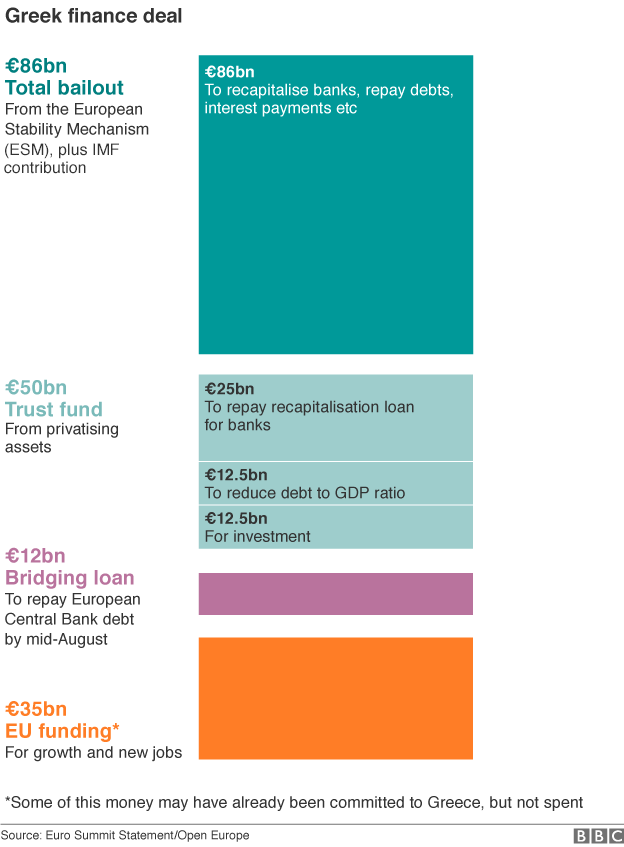Greece debt crisis: IMF attacks EU over bailout terms
- Published

The International Monetary Fund (IMF) has fiercely criticised the bailout deal offered to Greece by the eurozone.
It said Greece's public debt was now "highly unsustainable" and urged debt relief on a scale "well beyond what has been under consideration to date".
The IMF told European finance ministers, external a new bailout should include measures to restructure the country's debt.
The European Commission has now proposed a €7bn (£5bn) "bridging" loan to help Greece pay debt interest.
Some of the money could be used to repay the IMF.
Greece has already missed two deadlines to pay the Fund €1.6bn (£1.1bn) in debt interest on loans it has already received, earning it the dubious honour of being the first major Western economy to default on an IMF loan.
The European Commission's latest proposal for bridging finance may face opposition from the UK and other non-eurozone members of the EU.
The proposal envisages providing short-term financing to Greece from the European Financial Stability Mechanism (EFSM).
This fund is backed by all 28 members of the EU, rather than just the 16 members of the eurozone, which would mean UK taxpayers contributing further to financial support for Greece.
While the UK and others may oppose the use of the EFSM, the disbursement of its funds requires only a two-thirds majority - otherwise known as a qualified majority - of member states to vote in favour of providing the loan for it to be approved.
'Deep haircuts'
The split between the the IMF and Greece's European creditors over how best to deal with the country's debt crisis has been hinted at before, but this is the first time such a disagreement has been made public.
On Tuesday, the IMF made public advice it had given to the Eurogroup of finance ministers at the weekend.
Follow the latest updates here
The IMF study said European Union countries would have to give Greece 30-years to repay all its European debt, including new loans, and a dramatic extension on the maturity of its debts. Without such extensions creditors might have to accept "deep upfront haircuts" on existing loans, the IMF added.
One senior IMF official said the fund would only participate in a third bailout for Greece if EU creditors produce "a clear plan".
The current deal "is by no means a comprehensive, detailed agreement", the official said.
BBC Europe correspondent Chris Morris says the IMF's report was written before the eurozone reached a deal with Greece in the early hours of Monday morning.
Our correspondent adds that its contents were shared with eurozone leaders in advance, so they already knew how unhappy the IMF was when they did the deal.
Under the new bailout terms, eurozone governments will contribute between €40bn and €50bn to Greece's new three-year bailout, the IMF is expected to contribute another major chunk and the rest will come from selling off state assets and the financial markets.
The split between the IMF and the EU comes just hours before the Greek parliament is due to vote on a raft of economic reforms demanded of the Eurogroup over the weekend as a condition of a third Greek bailout.

A slogan in front of the Greek parliament reads 'Here lies Syriza, the party I once supported'
The measures - which face resistance from Prime Minister Alexis Tsipras' own MPs - include taxation increases and pension curbs.
Greece owes about 10% of its debt to the IMF.
It has missed two deadlines for repayment to the fund and is the first EU country ever to do so.
The IMF also said, external it regarded forecast rates of growth for Greece as unrealistically high.
Its analysis, released on Tuesday night, pointed to Greek government debt reaching a peak of close to 200% of GDP or national income - over the next two years, which it called "highly unsustainable".
The BBC's economics editor says the IMF's assessment makes it much harder for Mr Tsipras to persuade the Athens parliament to back the measures needed in Wednesday's votes.
It brings into question the validity of the reform measures demanded by the eurozone and endorses the kind of debt write-offs the Greek public have been arguing for, he adds.

Analysis: Robert Peston, BBC News, Economics editor
Why on earth should Greek MPs vote for a painful economic reform package which the IMF - the supposed global arbiter of these things - does not believe will put the country back on the path to prosperity?
The eurozone creditors, and Germany in particular, forced Alexis Tsipras - against his strong preference - to accept IMF participation in the next formal bailout package to be negotiated if Greek MPs pass the initial reform measures tonight.
They told him, in effect, he would be turfed out of the eurozone and into national ruin unless he took more of the IMF's money and fiscal bossiness.
Which also look tragically comic tonight - with the IMF saying that if it's all the same to Mrs Merkel, it would rather not touch Greece with a barge pole.
Or to be tediously literal, the IMF has made it clear that it does not wish to participate in any further Greek bailout, unless Germany and the rest drop their vehement opposition to big write-offs of Greek debt.

On Tuesday, Mr Tsipras said in an interview on state television that he did not believe in the bailout offered but was willing to implement it to "avoid disaster for the country" and the collapse of the banks.
The conditional agreement to receive up to €86bn (£61bn; $95bn) from the EU over three years depends on further economic reforms - including the labour markets, banks and privatisation - being passed after Wednesday.
Hard-liners in Mr Tsipras' own Syriza party are likely to rebel and the junior coalition party, the Independent Greeks, have offered only limited support for the reforms
Greek reforms - in 60 seconds
Meanwhile, unions and trade associations representing those including civil servants, municipal workers and pharmacy owners have called or extended strikes to coincide with Wednesday's parliamentary votes.
Greece also faces an immediate cash crisis. Banks have been shut since 29 June.
Mr Tsipras warned banks are unlikely to reopen until the bailout deal is ratified, and this could take another month.
A suggestion of providing Greece with emergency funding under the EU-wide European Financial Stability Mechanism has been opposed by Britain, which is not part of the euro but is an European Union member.
Greek laws to be passed by Wednesday
Ratifying eurozone summit statement, external
VAT changes: Top rate of 23% to extend to processed food, restaurants etc... 13% to cover fresh food, energy bills, water and hotel stays, 6% for medicines and books
VAT discount of 30% to be abolished on islands, but remotest islands to keep discount until next year
Corporation tax raised from 26-29% for small companies
Luxury tax for big cars, boats and swimming pools up from 10-13%; farmers' tax up from 13-26%
Early retirement to end (phased in by 2022); retirement age raised to 67
Greek statistics authority Elstat to have full legal independence
